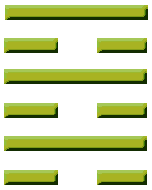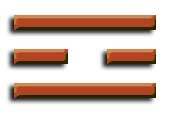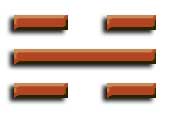
I Ching Hexagram nr. 64
|
Wèi Jì or Wei Chi – Not Yet Fording, before completion, not yet completed |
|
 Øverst |
Trigram: Li The Clinging, Flame |
 Nederst |
Trigram: K’an The Abysmal, Water |
Billedet:
Brand over vand: Billedet af tilstanden før overgangen. Den overlegne mand er således omhyggelig i differentieringen af ting, så at hver finder sin plads.
Når brand, som i sagens natur flammer opad, er over, og vand, der flyder nedad, er under, deres virkninger tage modsatte retninger og forbliver uafhængige. Hvis vi ønsker at opnå en effekt, må vi først undersøge arten af de kræfter i spørgsmål, og fastslå deres rette plads.
Hvis vi kan bringe disse kræfter til at bære på det rigtige sted, vil de have den ønskede effekt, og færdiggørelse vil blive nået. Men for at kunne håndtere eksterne kræfter ordentligt, skal vi frem for alt ankommer til den rigtige synspunkt os selv, for kun fra dette udsigtspunkt kan vi arbejde korrekt.
The Image
Fire over water: The image of the condition before transition. Thus the superior man is careful In the differentiation of things, So that each finds its place.
When fire, which by nature flames upward, is above, and water, which flows downward, is below, their effects take opposite directions and remain unrelated. If we wish to achieve an effect, we must first investigate the nature of the forces in question and ascertain their proper place.
If we can bring these forces to bear in the right place, they will have the desired effect and completion will be achieved. But in order to handle external forces properly, we must above all arrive at the correct standpoint ourselves, for only from this vantage can we work correctly.
I Ching helt enkeltHexagram nr. 64Dette hexagrams billede er foråret, den tid hvor vinterens mørke og forfald er ved at bøje sig for sommerens lys og overflod. Overgangen er endnu ikke fuldført; her påhviler det dig at styrke din klarhed, ro og samvittighedsfuldhed. Wei Chi fremkommer ofte som en angivelse af, at vi endnu ikke har opnået ægte, indre sindsligevægt. Så længe vi besvarer ydre pres med vort ego – ved at bekymre os, begære eller blive aggressive – opnår vi ikke succesfyldt utvungenhed. I Ching minder os lige nu om at opgive egoets hysteri til fordel for accept, beskedenhed og indre balance. Wei Chi betegner de store ansvarligheders tid. I en meget reel forstand kan det siges, at verdens tilstand afhænger af din tanke og adfærd lige nu. Den ydre verden vil kun falde i hak, hvis den indre allerede har gjort det. Søg derfor nu at rette hvad som helst i dig selv, der står i modsætning til den Vises principper. Dæmp dit ego, lad ydmyghed og accept være dine hovedmål, og gå frem som ræven på isen, dvs. forsigtigt og velovervejet. Ved at fastholde det gode og sande bygger du det fundament, hvorpå en gunstig skæbne kan falde til hvile. Generelt Du skal være særligt på vagt i de sidste par meter til succes. Kærlighed Hvis du ønsker at nå dit mål i dit forhold, må du ikke tillade dig selv at blive distraheret. Forretning Fokus på at nå dine forretningsmæssige mål og ikke tillad dig selv at blive distraheret. Personligt: Lad ikke stolthed eller utålmodighed for at komme i vejen for den succes, der er så tæt på. |
| Kommentar
From the book I Ching. This hexagram indicates a time when the transition from disorder to order is not yet completed. The change is indeed prepared for, since all the lines in the upper trigram are in relation to those in the lower. However, they are not yet in their places. While the preceding hexagram offers an analogy to autumn, which forms the transition from summer to winter, this hexagram presents a parallel to spring, which leads out of winter’s stagnation into the fruitful time of summer. With this hopeful outlook the Book of Changes come to its close. |
| Denne hexagram angiver en tid, hvor overgangen fra uorden til orden endnu ikke er afsluttet. Ændringen er faktisk forberedt, da alle linjer i den øverste trigram er i forhold til dem, der i den nederste. De er imidlertid ikke endnu er på deres pladser. Mens den foregående hexagram tilbyder en analogi til efterår, som danner overgangen fra sommer til vinter, dette hexagram præsenterer en parallel til foråret, som fører ud af vinterens stagnation i det frugtbare tid på sommeren. Med denne håbefulde udsigter Forvandlingernes bog (I Ching) kommer til sin afslutning. |
Nederste linje
Six at the beginning means: He gets his tail in the water. Humiliating.
In times of disorder there is a temptation to advance oneself as rapidly as possible in order to accomplish something tangible. But this enthusiasm leads only to failure and humiliation if the time for achievement has not yet arrived. In such time it is wise to spare ourselves the opprobrium of failure by holding back.
tekst
Linje 2
Nine in the second place means: He brakes his wheels. Perseverance brings good fortune.
Here again the time to act has not yet come. But the patience needed is not that of idle waiting without thought of the morrow. Kept up indefinitely, this would not lead to any success. Instead, an individual must develop in himself the strength that will enable him to go forward. He must have a vehicle, as it were, to effect the crossing. But he must for the time being use the brakes. Patience in the highest sense means putting brakes on strength. Therefore he must not fall asleep and lose sight of the goal. If he remains strong and steadfast in his resolve, all goes well in the end.
tekst
Linje 3
Six in the third place means: Before completion, attack brings misfortune. It furthers one to cross the great water.
The time of transition has arrived, but one lacks the strength to complete the transition. If one should attempt to force it, disaster would result, because collapse would then be unavoidable. What is to be done? A new situation must be created; one must engage the energies of able helpers and in this fellowship take the decisive step-cross the great water. Then completion will become possible.
tekst
Linje 4
Nine in the fourth place means: Perseverance brings good fortune. Remorse disappears. Shock, thus to discipline the Devil’s Country. For three years, great realms are rewarded.
Now it is the time of struggle. The transition must be completed. We must make ourselves strong in resolution; this brings good fortune. All misgivings that might arise in such grave times of struggle must be silenced. It is a question of a fierce battle to break and to discipline the Devil’s Country, the forces of decadence. But the struggle also has its reward. Now is the time to lay the foundations of power and mastery for the future.
tekst
Linje 5
Six in the fifth place means: Perseverance brings good fortune. No remorse. The light of the superior man is true. Good fortune.
The victory has been won. The power of steadfastness has not been routed. Everything has gone well. All misgivings have been overcome. Success has justified the deed. The light of a superior personality shines forth anew and makes its influence felt among men who have faith in it and rally around it. The new time has arrived, and with it good fortune. And just as the sun shines forth in redoubled beauty after rain, or as a forest grows more freshly green from charred ruins after a fire, so the new era appears all the more glorious by contrast with the misery of the old.
tekst
Øverste linje
Nine at the top means: There is drinking of wine In genuine confidence. No blame. But if one wets his head, He loses it, in truth.
Before completion, at the dawning of the new time, friends foregather in an atmosphere of mutual trust, and the time of waiting is passed in conviviality. Since the new era is hard on the threshold, there is no blame in this. But one must be careful in all this to keep within proper bounds. If in his exuberance a man gets drunk, he forfeits the favorableness of the situation through his intemperance.
tekst

Stil spørgsmål om I Ching
Stil lige så mange spørgsmål du har lyst til om I Ching
Det er gratis og nemt – Stil et spørgsmål
| Chien | Tui | Li | Chên | Sun | K’an | Kên | K’un | |
